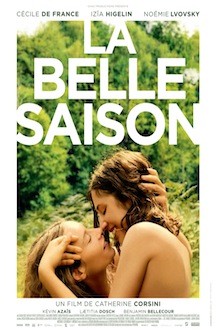Directed by Catherine Corsini
Country: France / Belgium
“Summertime” gently addresses a lesbian relationship between a 23-year-old country girl and a 35-year-old Parisian teacher who’s also a feminist militant. The year is 1971, and as expected, the society evinces a lot of discrimination and bias regarding the homosexual.
The inexperienced but tremendously competent Izia Higelin is Delphine, a tireless young woman who helps her parents on their farm, driving a tractor and collecting the hay to be stored. Delphine is attracted to women, having a secret 'friend' that informs her she’s going to get married to a man she doesn’t love just to change her life and escape the boring country life. Delphine feels tied and lonely in Limousin, a conservative little town, condemned to live with her family or eventually with Antoine (Kévin Azaïs), a farmer neighbor who’s in love with her since they were kids.
Life changes for the better when she goes to Paris with the intention of gaining her financial independence and bumps into Carole, played by the mature Cécile de France, a well-spoken feminist leader who, despite married and preliminarily hesitant, embarks on a torrid relationship with the country girl, abandoning everything to be with her.
Those jubilant times come to an end when Delphine's father, Maurice (Jean-Henri Compère) has a stroke, and she’s forced to return to the countryside to assist her quietly observant mother, Monique (Noémie Lvovsky), in the daily duties. Once deeply in love, the separation becomes unbearable for the two women, leading Carole to the farm.
Tension emerges when Antoine discovers their secret, refusing to be Delphine’s cat’s-paw. The case gets even bigger magnitude when Monique catches them sleeping together, and Delphine has to make the biggest decision of her life: family or love.
The film, directed and co-written by Catherine Corsini (“The New Eve”, “Leaving”, Three Worlds”) and warmly photographed by Jeanne Lapoirie (“Under the Sand”, “8 Women”), is converted into a rural melodrama after exhibiting activist demeanors painted with the 70's look.
Here and there, the story spreads some charm, but Ms. Corsini was unable to suppress a narrative unevenness. The message is valid; it was the attitude adopted and the way the film was cooked that could be slightly superior. I’m convinced that a raw approach, in the style of an indie drama, would have created a better impression. Anyway, as we reach the nostalgic conclusion, it's clear that the strong performances guarantee satisfactory dramatic levels in Ms. Corsini's effort.


